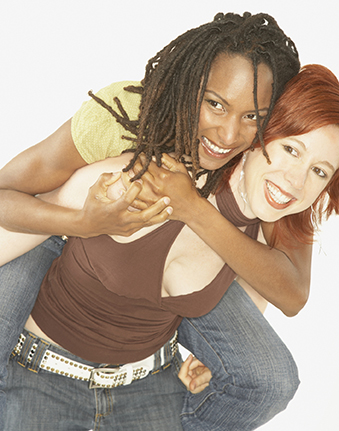I kneel down and fasten the timing chip neatly to my running shoe, stand up and take in the pack of runners around me. Hands on my hips, I take a breath. It occurs to me that I’m about to run 13.1 miles and I may not be sufficiently trained. As I stretch, I recall the contrast to a year ago, when I stood at the same start line as fit as I have ever been. I had primed my body by weight training, doing yoga between running days, combining interval training with my long runs, and building up mileage on my legs gradually. I have never been more prepared for a race. And yet, by mile 2 despite all my training, my calves were aching and my body hurt. I was uncomfortable and cranky all 13.1 miles. I ran my slowest race ever. The announcer’s voice startles me back into the present with a hearty, “Good luck runners!â€Â I tell myself there is no pressure. I won’t even look at my watch until mile 10. A runner to my right catches my eye, “Have a nice run,†she offers. I smile and reply, “You too. Honestly, I just want to finish!â€
 I run step after step, humming along with my iPod, and imagine my friends and family lining the course, high-fiving me as I pass. I begin smiling. When, at mile 10 I finally look at my watch, I realize I am running my fastest time ever. As I sprint across the finish line I glance at the clock and my mouth opens in a wide smile. I set a personal record in that race. I have thought about the contrast between these two events a lot and it occurs to me that it could have been a coincidence that I just had a bad run on my worst race, and that maybe the visualization I did along the course helped propel me in the second. But I suspect that that trying harder doesn’t necessarily yield better results for me. In fact, there is much evidence in my life that relaxing more and stressing less actually produces the best outcomes of all. I explore this theory further as I read the work of Dr. Lissa Rankin, author and health advocate whose work focuses on the relaxation response. The relaxation response is a physical state that changes the body’s response to stress that essentially counteracts the fight or flight response. I recall my show up somewhat prepared with no finish time goal pressure race and how fast I ran it. I can’t help but wonder how the relaxation response relates to dating. I think about my healthiest relationships and try to recollect if I just sort of showed up, untrained, refusing to look at my watch, or if I tried super hard, paid attention to every detail, and put pressure on myself in some way. Here I offer three ways the relaxation response applies to dating.
I run step after step, humming along with my iPod, and imagine my friends and family lining the course, high-fiving me as I pass. I begin smiling. When, at mile 10 I finally look at my watch, I realize I am running my fastest time ever. As I sprint across the finish line I glance at the clock and my mouth opens in a wide smile. I set a personal record in that race. I have thought about the contrast between these two events a lot and it occurs to me that it could have been a coincidence that I just had a bad run on my worst race, and that maybe the visualization I did along the course helped propel me in the second. But I suspect that that trying harder doesn’t necessarily yield better results for me. In fact, there is much evidence in my life that relaxing more and stressing less actually produces the best outcomes of all. I explore this theory further as I read the work of Dr. Lissa Rankin, author and health advocate whose work focuses on the relaxation response. The relaxation response is a physical state that changes the body’s response to stress that essentially counteracts the fight or flight response. I recall my show up somewhat prepared with no finish time goal pressure race and how fast I ran it. I can’t help but wonder how the relaxation response relates to dating. I think about my healthiest relationships and try to recollect if I just sort of showed up, untrained, refusing to look at my watch, or if I tried super hard, paid attention to every detail, and put pressure on myself in some way. Here I offer three ways the relaxation response applies to dating.
 1. We are more authentic.
1. We are more authentic.
Have you ever noticed how easily you laugh with your friends? It’s because there’s no charge there, no underlying tension of issues unresolved, or fear of rejection. Whenever we are truly relaxed in dating, we are more likely to let down our walls, and let who we really are shine. The best part about being our most authentic is that we are more likely to draw in women who are compatible with us, from friends to lovers.
2. Our relaxation is contagious.
If you’ve ever felt like a sponge for other people’s energy, then you know that as human beings designed to connect, we feel and are affected by others’ energy. So in dating, when your date shows up authentic, confident, and relaxed, it is easier for you to be the same. When she shows up nervous, awkward, and quiet, it is likely to bring about a similar response in you. Some studies show that good energy is actually more contagious than negative energy and that by cultivating it in ourselves we can bring even more of it into our lives as like attracts like.Â
3. We accept that we’re imperfect and still enough.
Perhaps the biggest benefit to relaxing in dating is the self-accepting state of mind where we appreciate ourselves, just as we are. We may be aware that we will always be learning, growing, and healing in some ways, but that in this moment we are just fine as is. The freedom that comes with this awareness opens up space in a relationship for both people to be imperfect, to heal old wounds, and to trust that we are lovable as we are. This mindset of self-love reduces the likelihood that we’ll act out of character, try to prove something, or to fib about who we are in general. Acceptance and unconditional love cultivate more connection and growth.
The overachiever in me may forever be more likely to try rather than just show up and see what happens. But in the meantime, I carry with me the awareness that sometimes letting go and relaxing into it is the best approach of all.
Kim Baker, author of Girls’ Guide to Healthy Dating: Between the Breakup and the Next U-Haul, is a dating columnist and writer whose writing examines healthier dating through the lens of mindfulness and self-care. Find her at www.girlsguidetohealthydating.com or join her email list by texting gg2dating to 22828, message and date rates may apply.


